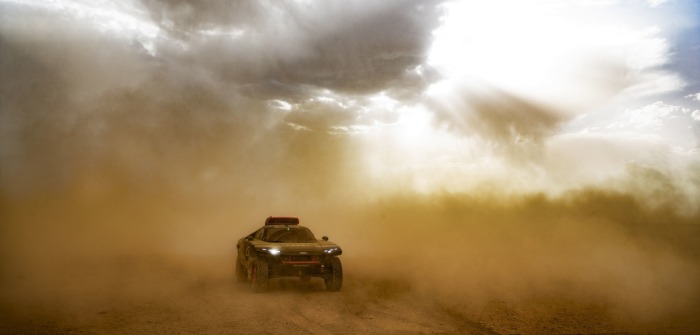Ahead of its debut at the Dakar Rally in January next year, the prototype Audi RS Q e-tron has completed two weeks of testing in the Moroccan desert.
Having previously carried out tests in Germany and Spain, three driver teams consisting of Stéphane Peterhansel, Carlos Sainz, Mattias Ekström and their co-drivers headed into the demanding environment to further validate the car’s drivetrain and electrical systems.
“For the test in Morocco, we made modifications so that the driver and co-driver have more space in the tight cockpit and can also communicate better with each other,” said Andreas Roos, responsible for factory motorsport projects, Audi Sport. “The feedback was positive.”
While carrying out the test program Audi team members encountered temperatures over 40oC.
“Sandstorms also hampered the testing,” commented Sven Quandt, team principal of Q Motorsport. “In addition, as expected, some new problems arose in the high temperatures, which repeatedly caused interruptions to the testing and needed to be solved before the next test.”
“We expect much lower temperatures at the Dakar Rally,” added Roos. “Nevertheless, we deliberately went to Morocco to test our concept under the most extreme conditions. Components such as the MGU, for example, were basically not developed for use in such high ambient temperatures, but the drivetrain and other components were also pushed to their limits or even beyond by the heat. The insights we gained in Morocco are invaluable, but they also show us that we still have a lot to do before the Dakar Rally and there is not much time left.”
Additionally, the high-voltage battery system that powers the racing Audi prototype has been specifically designed to ensure that it meets the demands of the punishing rally.
“It’s all about optimum temperature management and being able to call up the battery’s maximum performance,” explained Roos. “This is where we are learning with every test. And that’s exactly why we are going to the desert with an electrified drivetrain: We are gaining an incredible amount of experience that we are sharing with our colleagues from road car development.”


